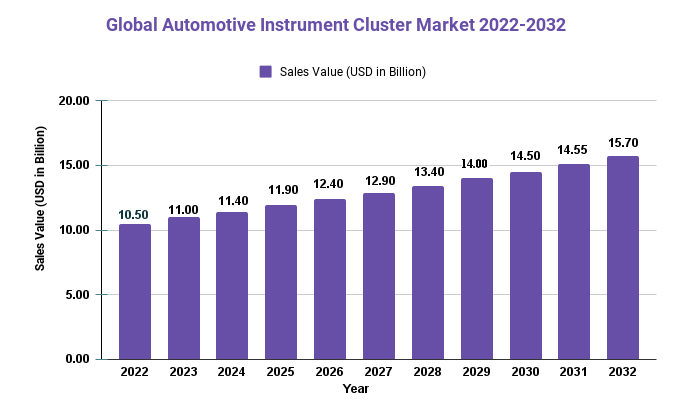Global Automotive Instrument Cluster Market Sales to Top USD 15.7 Billion in Revenues by 2032 at a CAGR of 4.1%

Page Contents
Market Overview
Published Via 11Press : The automotive instrument cluster market is an essential component in a vehicle that displays crucial information to the driver, including speed, fuel level, engine temperature, and warning lights. The instrument cluster market has been growing steadily due to the increasing demand for connected cars with advanced infotainment systems. Moreover, as automobile manufacturers focus on enhancing driving experiences and safety features, there is a need for smarter and more intuitive instrument clusters.
The Global Automotive Instrument Cluster Market size is expected to be worth around USD 10.5 Billion by 2023 from USD 15.7 Billion in 2032, growing at a CAGR of 4.1% during the forecast period from 2022 to 2032.
The digital revolution has also played a significant role in shaping the market landscape of automotive instrument clusters. Consumers increasingly prefer digital displays over analog gauges as they offer more flexibility and customization options. In response to this trend, leading manufacturers are incorporating high-resolution screens with advanced graphics capabilities into their instrument clusters.
Another key driver of the automotive instrument cluster market is the rise in electric vehicles (EVs). As EVs require different types of information compared to traditional internal combustion engine vehicles (ICEVs), new types of gauge designs are being developed explicitly for EVs. This creates new opportunities for companies operating in the automotive instrument cluster market to cater to evolving consumer preferences and needs.

Request For Sample Report Here: https://market.us/report/automotive-instrument-cluster-market/request-sample/
Regional Snapshot
- North America: is the dominant market in North America for instrument clusters, led by the United States. Market growth is driven mainly by increasing demand for vehicles equipped with digital instrument clusters; other contributors include electric cars and leading instrument cluster manufacturers.
- Europe: will experience rapid market expansion due to rising consumer demand for vehicles equipped with advanced technologies and features, including digital instrument clusters which have seen a great uptick in autonomous and connected vehicle growth. Germany, France and the United Kingdom will remain major players in this market segment.
- Asia Pacific: With increasing passenger vehicle demand and rising incomes in China and India, this region will experience rapid market expansion for automotive instrument clusters. Furthermore, significant investments are underway into producing electric/hybrid cars which fuel demand for digital instrument clusters.
- Latin America: Latin America's market for automotive instrument panels is driven mainly by an increase in commercial vehicles, as well as rising consumer interest for connected and advanced cars with digital instrument clusters.
- Middle East and Africa (MENA): With the increasing adoption of cutting-edge features and technologies, the Middle East and Africa is expected to experience steady market expansion for automotive instrument clusters. Market expansion here will likely be fuelled by increasing high-end vehicle demand as well as investing in connected/autonomous vehicle research development projects.
Drivers
- Demand for advanced features and technology in cars: This demand has contributed significantly to the expansion of automotive instrument clusters.
- Adoption of autonomous and connected vehicles on the rise: As autonomous and connected cars become more widespread, demand increases for digital instrument clusters which provide drivers with real-time data.
- Hybrid and electric vehicle sales continue to rise: As demand increases for hybrid and electric cars, digital instrument clusters must display battery information such as charging status and range information in real-time.
- Increased production and sale of automobiles: Rising auto production and sale is fuelling the market for automotive instrument clusters in emerging economies, driving sales.
- Market growth is being propelled by technological innovations in automotive instrument clusters – for instance, the introduction of 3D displays – driving an increase in automotive instrument sales.
Restraints
- Cost of Digital Clusters: Digital instrument cluster prices remain prohibitive compared to their analog counterparts and this has significantly limited the growth of automotive instrument clusters.
- Cybersecurity: Market expansion may be hindered by cybersecurity threats posed by digital instrument clusters' increasing interconnection, including data breaches and hacking attempts.
- Installation and Maintenance Complexity: Digital instrument clusters require more installation and upkeep than analog ones, which is both expensive and time-consuming for manufacturers as well as customers.
- Regulation and Compliance: Automotive industry has several stringent compliance and regulation standards that may impede digital instrument cluster development.
- Standardization issues may hinder the adoption and expansion of digital instrument clusters.
Make an inquiry before picking up this report @ https://market.us/report/automotive-instrument-cluster-market/#inquiry
Opportunities
- Integrating Instrument Clusters Into Other Vehicle Systems: Manufacturers can enhance customer experiences by incorporating instrument clusters with other vehicle systems, like navigation or infotainment systems, providing advanced functionality and features to customers.
- Digitized instrument clusters for commercial vehicles are becoming an attractive prospect for manufacturers looking to reach more of the market while fulfilling logistics and fleet companies' demands.
- Aftermarket expansion: Manufacturers can offer digital instrument cluster upgrades for customers seeking to customize existing vehicles.
- Emerging car markets present manufacturers with an opportunity to expand their presence in these markets by expanding customer reach for their product offerings.
- Artificial Intelligence and Machine Learning: Manufacturers can deliver more personalized user experiences and enhance the information displayed by using artificial intelligence within instrument clusters to deliver personalized user experiences and provide more relevant data for them.
Challenges
- The competition of traditional analog clusters: Traditional analog instrument clusters still have a following among some customers, which could pose a threat to the market growth for digital instrument clusters.
- Product lifecycles are short: Due to the rapid technological changes and product cycles, digital instrument clusters can be difficult product for manufacturers to keep up with.
- Costs of development: Digital instrument clusters have high costs of development. Manufacturers may find it difficult to balance these costs against the demand for their products and with pricing.
- Education of consumers: Manufacturers will have to educate their customers about the features and benefits of digital instrument clusters. This can be a difficult task in marketing and promotional efforts.
- Disruptions in the supply chain: COVID-19 has exposed the vulnerabilities of global supply networks. Manufacturers may have difficulty sourcing the materials and components required for the production of digital instrument clusters.
Key Market Players
- Continental
- Visteon
- Denso
- Nippon Seiki
- Magneti Marelli
- Yazaki
- Delphi
- Bosch
- Calsonic Kansei
- Feilo
Key Market Segments
Type
- Hybrid Cluster
- Analog Cluster
- Digital Cluster
Application
- Passenger Vehicle
- Commercial Vehicle
Top Impacting Factors
- Technology advancements: The market for automotive instrument clusters is propelled forward by advances in technology such as digital instrument clusters and displays with augmented reality displays, both of which improve user experiences while increasing the functionality of instrument clusters. As these advances increase market growth exponentially.
- Demand for electric vehicles continues to surge: this trend drives automotive instrument cluster sales for these cars. Instrument clusters must display battery information, charge status updates, and driving range maps in their displays for electric vehicle users.
- Demand for autonomous and connected vehicles: Autonomous and connected vehicle demand has driven the growth of automotive instrument cluster markets; instrument clusters must display information in real-time while also seamlessly integrating with navigation and infotainment systems for these cars.
- Regs & Compliances: Automotive industry faces stringent regulatory requirements and issues of compliance related to safety and emission issues, in particular. Instrument clusters equipped with advanced technology that displays relevant information can assist drivers in meeting regulations and requirements is one of the keys drivers need in complying with them.
- Consumer Demand for New Features and Technology: Automotive instrument cluster manufacturers have become more aggressive at meeting customers' desires for advanced features in their cars, like digital instrument clusters. Manufacturers aim to meet this increasing consumer demand while distinguishing themselves from their competition and establishing themselves as market leaders in this space.
- Raw Materials and Component Availability: One key aspect that impacts instrument cluster production is the availability of components and raw materials required for its creation. Any interruptions or shortages in supply chains could halt their production altogether.
Recent Developments
- Cost of digital clusters: The cost of digital clusters compared with traditional analog clusters has been a significant restraint on the growth of automotive instrument clusters.
- Cybersecurity: The market's growth may be affected by cybersecurity concerns, such as data breaches and hacking, due to the increasing interconnectedness of digital instrument clusters.
- Installation and maintenance complexity: Digital instrument clusters require more installation and upkeep than analog ones, and this can be a problem for both manufacturers and customers.
- Regulations and compliance: In the automotive industry, there are many regulatory and compliance requirements that can impact on digital instrument cluster development.
- The lack of standardization can limit the adoption of and growth of digital instrument clusters.
Market Report Scope
| Report Attribute | Details |
| The market size value in 2022 | USD 10.5 Bn |
| Revenue Forecast by 2032 | USD 15.7 Bn |
| Growth Rate | CAGR Of 4.1% |
| Regions Covered | North America, Europe, Asia Pacific, Latin America, and Middle East & Africa, and Rest of the World |
| Historical Years | 2017-2022 |
| Base Year | 2022 |
| Estimated Year | 2023 |
| Short-Term Projection Year | 2028 |
| Long-Term Projected Year | 2032 |
Frequently Asked Questions
Q: What is the current size of the Global Automotive Instrument Cluster Market?
A: The Global Automotive Instrument Cluster Market size is USD 10.5 Billion in 2022.
Q: What is the projected growth rate for the Global Automotive Instrument Cluster Market?
A: The Global Automotive Instrument Cluster Market is expected to grow at a CAGR of 4.1% from 2023 to 2032.
Q: What are some of the key players in the Global Automotive Instrument Cluster Market?
A: Some of the key players in the Automotive Instrument Cluster market include Continental, Visteon, Denso, Nippon Seiki, Magneti Marelli, Yazaki, Delphi, Bosch, Calsonic Kansei, Feilo
Communication contact:
Global Business Development Team – Market.us
Market.us (Powered by Prudour Pvt. Ltd.)
Send Email: [email protected]
Address: 420 Lexington Avenue, Suite 300 New York City, NY 10170, United States
Tel: +1 718 618 4351
Website: https://market.us
Content has been published via 11press. for more details please contact at [email protected]
The team behind market.us, marketresearch.biz, market.biz and more. Our purpose is to keep our customers ahead of the game with regard to the markets. They may fluctuate up or down, but we will help you to stay ahead of the curve in these market fluctuations. Our consistent growth and ability to deliver in-depth analyses and market insight has engaged genuine market players. They have faith in us to offer the data and information they require to make balanced and decisive marketing decisions.


